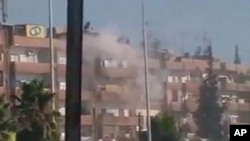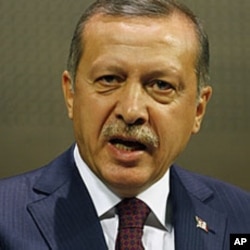Syria's military has launched an offensive against the eastern city of Deir el-Zour, even as international pressure builds on the government to end its crackdown on a popular uprising. There has also been violence in Houleh in Homs province. Activists say at least 55 people have been killed in the unrest across Syria on Sunday. These casualty reports have not been confirmed because independent journalists are not allowed to go into the region.
Deir el-Zour
Tanks and troops moved into Deir el-Zour before dawn Sunday, and witnesses say gunfire and blasts can be heard across the city.
Amateur video claiming to show the attack was posted on social media sites Sunday, although its authenticity could not be independently verified. Deir el-Zour has been at the forefront of the anti-government uprising, but until now had been largely spared the military crackdown.
A spokesman for the Arab Commission for Human Rights, Haytham Manna, says communications to the city are disrupted but he has received the names of some of those killed. He says the government is also conducting operations in Houleh, in Homs province, and elsewhere.
"We have six people killed because of this military attack," said Manna. "And at the same time, we have four people killed in Idlep and today [Sunday] we have more than ten people killed around the north and northeast regions in Syria. "
Hama
The assaults come one week after the military launched a similar offensive on Hama, another city with a strong protest movement. That attack began the day before Ramadan, the holy month, during which many protesters said they hoped they would see stepped up efforts to bring the government in Damascus to an end.
Syrian state media said that local leaders in Deir el-Zour requested the military intervention to protect citizens. The government argues it's fighting armed gangs and extremists spurred on by foreign meddling, a narrative contradicted by witness accounts, amateur video reports, human rights groups and the U.N. Security Council.
Turkish Prime Minister Recep Tayyip Erdogan added his voice to the criticism of the crackdown, saying the patience of his government is running out.
He said Foreign Minister Ahmet Davutoglu will head to Damascus Tuesday, and warned that Turkey will take unspecified actions depending on the outcome of the talks. Syria's northern neighbor has become increasingly frustrated with its regional partner and has played host to thousands of refugees from the conflict.
Arab reaction
Arab nations are also speaking out. The Gulf Cooperation Council (GCC) has issued its first statement on the unrest, calling for an immediate end to the violence and for political reforms in Syria.
The United States and others estimate about 2,000 people have been killed since the uprising began in March.
The Syrian government has announced several reform measures, most recently free and fair parliamentary elections this year, promises dismissed by critics as hollow. U.N. Secretary-General Ban Ki-moon told Syrian President Bashar al-Assad in a phone call Saturday that for the measures to gain credibility, the government must stop the use of force and end mass arrests immediately.





